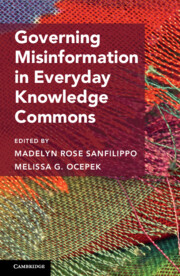Governing Misinformation in Everyday Knowledge Commons
Governing Misinformation in Everyday Knowledge Commons delves into the complex issue of misinformation in our daily lives. The book synthesizes three scholarly traditions – everyday life, misinformation, and governing knowledge commons – to present ten case studies of online and offline communities tackling diverse dilemmas regarding truth and information quality. The book highlights how communities manage issues of credibility, trust, and information quality continuously, to mitigate the impact of misinformation when possible. It also explores how social norms and intentional governance evolve to distinguish between problematic disinformation and little white lies. Through a coproduction of governance and (mis-)information, the book raises a set of ethical, economic, political, social, and technological questions that require systematic study and careful deliberation. This title is also available as Open Access on Cambridge Core.
Madelyn Rose Sanfilippo studies sociotechnical governance, broadly exploring privacy, inequality, and the political consequences of information technology. She has coedited Governing Privacy in Knowledge Commons (2021) and Governing Smart Cities as Knowledge Commons (2023), and coauthored three previous books: Online Trolling and Its Perpetrators: Under the Cyberbridge (2016), Social Informatics Evolving (2015), and Multiculturalism and Information and Communication Technology (2013).
Melissa G. Ocepek studies everyday information behavior, critical theory, copyright, and food studies. She has coauthored Food in the Internet Age (2013) and Formal and Informal Approaches to Food Policy (2014), and coedited Deciding Where to Live: Information Studies on Where to Live in America (2020).

